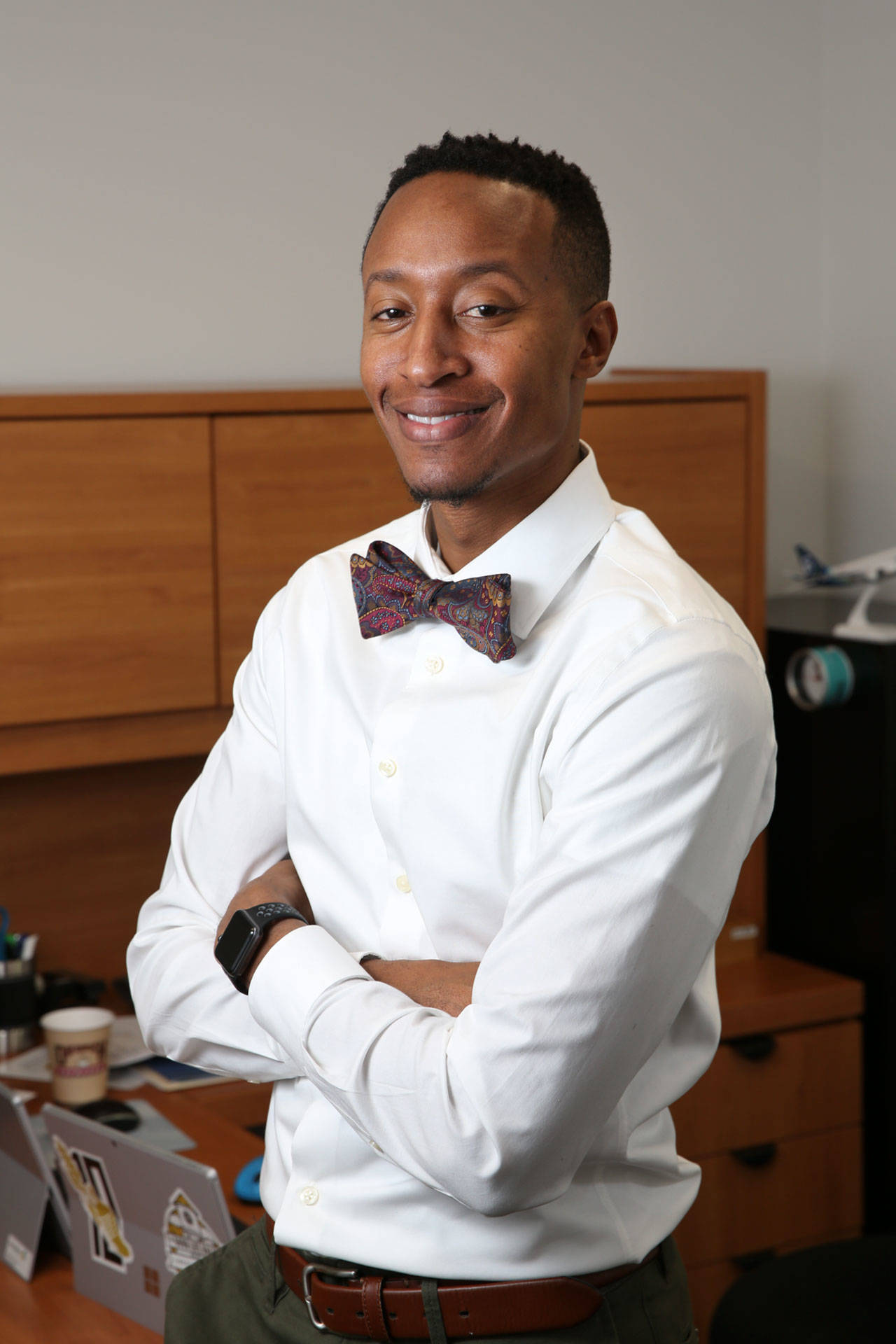EVERETT — Garry Clark, the new CEO of Economic Alliance Snohomish County, can’t wait to show off the county to his family — the beaches and downtowns, the sunsets from Everett’s new pedestrian bridge, and those raucous sea lions.
Clark arrived here from Nebraska in February, but his wife, Tina, a fourth-grade teacher in Omaha, and his three children, ages 4, 6 and 12, won’t be joining him until later this year.
Clark, a college track star and writer, hit the ground running.
“I’m trying to get as many meetings in as possible,” he said from his new Everett office, still unadorned except for some Nebraska stickers on his laptop computer.
In six weeks he’s met virtually or in-person with, among others, Rich White, the senior manager of state and local government operations at the Boeing Co.; Bill McSherry, vice president of government operations for Boeing Commercial Airplanes; Lisa Lefeber, CEO of the Port of Everett; and Everett Mayor Cassie Franklin.
Economic Alliance, which serves as a development organization and countywide chamber of commerce, expects to play a key role in helping Snohomish County recover from the COVID-19 economic downturn.
“We’ve started this process already,” Clark said. “The county, which is our partner, as well as the municipalities in the county, are all dedicated to making sure we focus on the retention and expansion of our existing businesses.”
“We’ll be using the funds we have, or potentially will have, to provide a bridge for businesses to continue throughout this pandemic,” Clark said. “That’s priority number one.”
Economic Alliance was formed in 2011 in a merger between three groups: the Economic Development Council of Snohomish County, the Greater Everett Chamber of Commerce and the South Snohomish County Chamber of Commerce. The group supports job growth, commercial airline service at Paine Field and development of the Cascade Industrial Center, which spans Marysville and Arlington.
During the COVID-19 pandemic, Economic Alliance has fostered conversation with weekly “coffee chats” — free, virtual gatherings open to all. The series has featured Boeing executives, Edmonds resident and world traveler Rick Steves, and University of Washington President Ana Mari Cauce. Attendance sometimes tops 200 or more people.
On Wednesday, the group is offering a virtual introduction to Economic Alliance.
Clark replaces Chris Mefford, interim president from October 2020 to March 2021. Before that, Dom Amor was interim president from March 2020 to September 2020.Amor stepped in after CEO Patrick Pierce’s departure last year.
Pierce, the Alliance’s CEO since 2016, left to take a job as economic development director in the Town of Clayton, North Carolina.
A nationwide quest for a replacement ensued.
The search touched down in a small town on the edge of a prairie — Fremont, Nebraska, population 26,000.
There, Clark served as president and CEO of the Greater Fremont Development Council, a nonprofit affiliated with the Greater Omaha Chamber of Commerce.
Before that, Clark worked as the Nebraska Investment Finance Authority’s opportunity fund manager in Omaha and, earlier, as economic development director of Cuming County in northeast Nebraska.
On a trip to Snohomish County in December, he stayed in downtown Everett, where he spoke with merchants and strolled along the waterfront. “I had an amazing time. Everyone was so welcoming,” he said.
Paul Dolan, chair of Economic Alliance, said the board of trustees sought a candidate with strong economic development skills and the ability to advocate for Snohomish County businesses.
Clark fit the bill.
“Garry’s expertise, energy and commitment align with Economic Alliance’s strategic direction,” Dolan said. “He has the full endorsement of all those involved, and we are all certain he will bring a fresh perspective, new ideas and cohesive partnering across all sectors countywide.”
Clark is a graduate of Dana College and the University of Nebraska at Omaha, where he earned a master’s degree in urban studies and public administration.
But Nebraska represents just one part of Clark’s life story. On his LinkedIn profile, Clark describes himself as a native Washingtonian. But it’s not the Evergreen State he’s referring to.
He spent his first 18 years growing up in 13 different homes and housing projects in Washington, D.C.
His young life, and the challenges he faced — parents who struggled with addiction, gun violence that took the lives of childhood friends — is recounted in his book, “Unlikely Viking: From the D.C. Projects to Rural Nebraska.” “Viking” refers to the Dana College mascot. Clark earned a bachelor’s degree and was inducted into the college’s Hall of Fame for track and field. The small Blair, Nebraska, college closed in 2010.
“People said I should write a book,” he said. “My parents were both addicts. I’ve been shot at, my friends had been shot at. My goal was to get out of there, and someday be in a position where I could help others,” he said. “This is a huge opportunity.”
Those experiences, and the perseverance and fortitude he mustered to overcome hardship, still guide him. “I learned you don’t give up, even when you’re at your lowest point or where you feel like you don’t have options,” Clark said. “Going through the struggles of poverty and the other ills of society has made me realize how important it is that we create opportunities for everyone.”
Janice Podsada; jpodsada@heraldnet.com; 425-339-3097; Twitter: JanicePods
Talk to us
> Give us your news tips.
> Send us a letter to the editor.
> More Herald contact information.

























